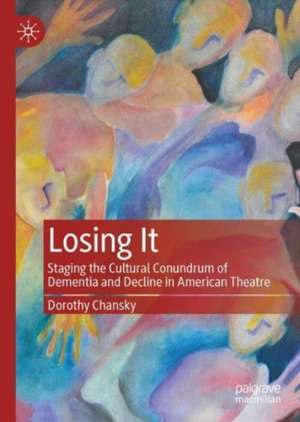Losing It: Staging the Cultural Conundrum of Dementia and Decline in American Theatre
Autor Dorothy Chanskyen Limba Engleză Hardback – 9 aug 2023
Preț: 786.04 lei
Preț vechi: 958.59 lei
-18% Nou
Puncte Express: 1179
Preț estimativ în valută:
150.40€ • 157.04$ • 124.48£
150.40€ • 157.04$ • 124.48£
Carte tipărită la comandă
Livrare economică 05-19 aprilie
Preluare comenzi: 021 569.72.76
Specificații
ISBN-13: 9783031209017
ISBN-10: 303120901X
Pagini: 328
Ilustrații: XII, 328 p. 12 illus., 6 illus. in color.
Dimensiuni: 148 x 210 mm
Greutate: 0.56 kg
Ediția:1st ed. 2023
Editura: Springer International Publishing
Colecția Palgrave Macmillan
Locul publicării:Cham, Switzerland
ISBN-10: 303120901X
Pagini: 328
Ilustrații: XII, 328 p. 12 illus., 6 illus. in color.
Dimensiuni: 148 x 210 mm
Greutate: 0.56 kg
Ediția:1st ed. 2023
Editura: Springer International Publishing
Colecția Palgrave Macmillan
Locul publicării:Cham, Switzerland
Cuprins
PART I: ORIENTATION.- Chapter 1: Introduction.- Chapter 2: Dementia, Alzheimer’s, Age: Intersectionalities.- Chapter 3: Bodies in the Audience/Bodies Onstage: Intersectionalities.- PART II: SOCIAL INSECURITY.- Chapter 4: Walk-on: Joint Owners in Spain.- Chapter 5: Supporting Role: All the Living.- Chapter 6: Willy Loman Center Stage: Death of a Salesman.- PART III: TAKING IT PERSONALLY Chapter 7: From the Inside Brain Crash: Wings “I am an Archive”: Ruff.- Chapter 8: Inside (and) Out “Who exactly am I?”: The Father.- PART IV: HUMAN. RESOURCES.- Chapter 9: Memory. Loss. Or, Understanding Memory (for Dummies).- Chapter 10: Family Affairs Sign on the Dot(ty)ed Line: Dot Brief me on this: Our Mother’s Brief Affair.- Chapter 11: Ready for Prime Time: Marjorie Prime.- Chapter 12: Cellular Data.- Chapter 13: No. Regrets. Wav(erly)ing Goodbye: The Waverly Gallery Humans. Resources.: The Humans.- Chapter 14: Who Cares?.
Notă biografică
Dorothy Chansky is a Professor in the School of Theatre and Dance at Texas Tech University, USA, where she is a President's Excellence in Research Professor. She was Founding Director of Tech's Humanities Center and a past President of the American Theatre and Drama Society as well as Vice President for Publications of the American Society for Theatre Research. Dorothy’s previous publications include Composing Ourselves: The Little Theatre Movement and the American Audience (2004) and Kitchen Sink Realisms: Domestic Labor, Dining, and Drama on the American Stage (2015). She was editor of Theatre Annual: A Journal of Theatre and Performance of the Americas from 2011-2016 and is a former Book Review Editor of Theatre Journal. She is a current member of the Translation, Adaptation, and Dramaturgy Working Group of the International Federation for Theatre Research.
Textul de pe ultima copertă
This monograph is a study of American (U.S.) stage representations of dementia mounted between 1913 and 2019. Its imbricated strands are playtexts; audiences as both the targets of the productions (artifacts in the marketplace) and as anticipated determinants of legibility; and medical science, both as has been (and is) known to researchers and, more importantly, as it has been (and is) known to educated general audiences. As the Baby Boom generation finds itself solidly in the category of “Senior,” interest in plays that address personal and social issues around cognitive decline as a potentially frightening and expensive experience, no two iterations of which are identical, have, understandably, burgeoned. This study shines a spotlight on eleven dementia plays that have been produced in the United States over the past century, and seeks, in the words of medical humanities scholar Anne Whitehead, to “open up, and to hold open, central ethical questions of responsiveness, interpretation, responsibility, complicity and care.”
Dorothy Chansky is a Professor in the School of Theatre and Dance at Texas Tech University, USA, where she is a President's Excellence in Research Professor. She was Founding Director of Tech's Humanities Center and a past President of the American Theatre and Drama Society as well as Vice President for Publications of the American Society for Theatre Research. Dorothy’s previous publications include Composing Ourselves: The Little Theatre Movement and the American Audience (2004) and Kitchen Sink Realisms: Domestic Labor, Dining, and Drama on the American Stage (2015). She was editor of Theatre Annual: A Journal of Theatre and Performance of the Americas from 2011-2016 and is a former Book Review Editor of Theatre Journal. She is a current member of the Translation, Adaptation, and Dramaturgy Working Group of the International Federation for Theatre Research.
Caracteristici
Historicizes representations of dementia and decline on the American stage
Considers links between dementia and age, with a focus on how these are presented onstage
Insists on the importance of bodily presence in theatrical representation
Considers links between dementia and age, with a focus on how these are presented onstage
Insists on the importance of bodily presence in theatrical representation
